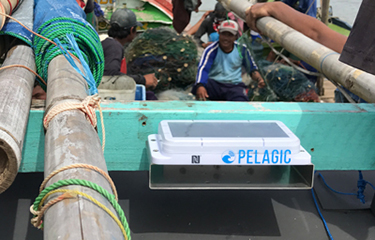 Pelagic Data Systems, Seafood Champion Award for Innovation
Pelagic Data Systems, Seafood Champion Award for Innovation
By Cliff White
Since its rise as a top priority for the seafood industry, the global fight against illegal, unreported and unregulated (IUU) fishing has been focused the efforts and changes being made by multinational fishing and seafood companies.
But Pelagic Data Systems (PDS), a Silicon Valley start-up based in San Francisco, California, early on recognized that the fight against IUU would be won or lost amongst small-scale fishing craft, which account for 95 percent of the world’s fishing fleet.
In response, PDS created a lightweight vessel tracking system specifically optimized for use on small vessels. It differs from the Automatic Identification System (AIS) and the Vessel Monitoring System (VMS) in that those systems utilize VHS radio or satellite signals, while the Pelagic system stores data until it comes within range of a cellphone signal, which the system then uses to send the data. Additionally, the pelagic system is solar-powered, while the former requires an onboard power supply. And perhaps most importantly, it is a low-cost passive system suitable for small-scale, artisanal fishers.
For its efforts, PDS has won the 2018 Seafood Champion Award for Innovation, which is given annually to an individual or organization that “identifies and applies creative new solutions to address ecological challenges, existing market needs, or barriers to sustainability.”
Pelagic Data Systems CEO Dave Solomon and the company’s chief scientific officer, Melissa Garren, told SeafoodSource the PDS was honored with the award.
“We pride ourselves on pushing the envelope of innovation to put technology in the service of humanity and the environment,” Solomon said. “We are driven to make cutting-edge technologies that serve the triple bottom line of sustainable communities, sustainable environments, and sustainable businesses for the fisheries sector. The status quo on the oceans for many centuries has been that of a black box where there has been little or no visibility into who, what, where, why, or when events occurs – the time is ripe for new technologies to universally enable transparency, traceability, and accountability at sea.”
PDS now works in more than 20 countries across the globe, spanning an enormous range of social-political and environmental contexts. The company has partnered with Real Good Fish, a community supported fishery that makes weekly deliveries of locally caught seafood to about 1,500 shareholders in the Monterey and San Francisco Bay areas. The partnership provides Real Good Fish’s members detailed information about where, when, and how their seafood was caught, via a weekly email newsletter.
Recently, PDS was recognized by the National Geographic Society for its innovative and leading efforts in the marine protection arena.
We are incredibly excited and honored to be recognized both by the seafood industry and NatGeo for our team's efforts and successes in demonstrating that the triple bottom line is the future and an attainable ideal for companies in the marine technology arena,” Garren said. “We are raising the standard for transparency, traceability, and accountability at sea for the global seafood sector. We provide innovative data solutions to improve efficiencies, sustainable management, and livelihoods for coastal communities and the seafood industry in dozens of countries across the globe.”
Solomon said his hope in winning the award is that it leads to greater global adoption of PDS technology.
“We are continuously adapting, customizing, and increasing the impact that vessel tracking and data analytics have within the seafood sector,” he said. “We are thrilled for this honor and the recognition that it brings among current and potential partners around the globe to expand our impact.”





